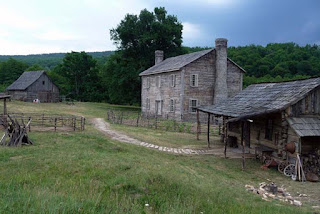The Consequence of Sound
By Dominick Suzanne-Mayer
September 26, 2015
Film Review: The Keeping Room
In history class, growing up, you learn a very clean,
bloodless version of history. To a point, it makes sense; explaining the truest
atrocities of man to a child of single-digit age is both a little cruel and a
lot difficult. But time and fear sands off the more vicious edges of a great
many things, particularly when it comes to America’s formative years. The Keeping
Room is a film about Sherman’s March in a fashion, but it considers what it is
to be on the losing side at the end of a war from a cruelly human point of view
The film you probably heard described as “the feminist
Western” in passing if you happened to attend a festival sometime in the past
year, The Keeping Room is more of a deliberately paced tone poem about loss,
though both of those descriptors are at least partially valid. After her father
and brother were called to fight for the South and never returned, and their
mother left them through circumstances left unspoken, Augusta (Brit Marling)
runs her family’s modest farm home. With her younger sister Louise (Hailee
Steinfeld) and the family’s slave caretaker Mad (Muna Otaru), Augusta tends the
farm, sets the table for dinner, and waits for whatever may come to arrive.
The uneasy delicacy of the film’s early scenes gives way
to dread when a pair of apparent Union defectors (Sam Worthington and Kyle
Soller) start sniffing around the nearby area, an accident leads to Louise
taking ill, and the frail ecosystem preserving the remaining family from the
brutality of the new, larger world begins to close in on them. The Keeping Room
hails back to the innate terrors of an older world, a world where the coming of
darkness covers all in shadow and a lone figure off in the distance constitutes
an inevitable, impending evil. Even so much of the daylight captured is full of
shadow and the impending setting of the sun.
The film is pointed about its deeper ideas, chiefly what
it was and would be to be a woman, particularly a young and appealing woman,
during that time. The Keeping Room takes great pains laboring over its wide
panoramas of empty, long-deserted lands and the relative size of the women
within them, which only adds to the escalating paranoia that its uniformly
perfect performances manage. The jaw-set strength that’s always lived under
even Marling’s more vulnerable performances is foregrounded here as she has to
deny all but her most survivalist instincts, even in the quieter moments where
she gets to wonder whether it might not have been nice to be a kept woman, in a
different time.
The Keeping Room is quick (perhaps too quick), blunt, and
brutal, showcasing the escalating horrors of true vulnerability with a grace
and minimalism that exceeds the film’s modest-bordering-on-muted storytelling.
To its credit, Julia Hart’s screenplay is most often interested in small notes
(a suspicious glance at a bar, the errant firing of a rifle) and the social
dynamics within the home than in the more melodramatic Western trappings; it’s
telling that the film’s embraces of the Western mode land with less impact than
the moments when it concentrates on the inherent sadism of trying to get by in
a world like this one. And all of this when somewhere off in the distance, the
sky is still burning all the while.
The Keeping Room – International
title
A 2013 U.S.A., Romanian
co-production [Gilbert Films (Los
Angeles), Wind
DancerProductions, (Anaheim), Anonymous Content (Culver City)]
DancerProductions, (Anaheim), Anonymous Content (Culver City)]
Producers: Jordan Horowitz, David
McFadzean, Dete Meserve, Patrick Newall, Judd Payne, Nicole Romano
Director: Daniel Barber
Story: Julia Hart
Screenplay: Julia Hart
Cinematography: Martin Ruhe
Music: Martin Phipps, Emily Barker
Running time: 95 minutes
Story: During the waning days of
the Civil War, two Southern sisters and a slave must defend themselves against
two Union Army soldiers.
Cast:
Augusta – Brit Marling (Brittany
Marling)
Louise – Hailee Steinfield
Moses – Sam Worthington (Samuel
Worthington)
Mad - Muna Otaru
Henry – Kyle Soller
Caleb - Ned Dennehy
Moll - Amy Nuttall
Bill - Nicholas Pinnock
Alma - Anna-Maria Nabirye
Prudence - Luminita Filimon
Carriage driver - Charles Jarman
Mary – Delia Riciu
Battle – Zefir
Nathaniel – Bogdan Farkas
Father - Stefan Velniciuc
Stunt coordinator: Ciprian
Dumitrascu
Stunts: Florin Barcun, Mihai Ionita, Dudu Mihai, Nicolae Stoica
YouTube
Trailer link: https://www.youtube.com/watch?v=0LCgZ9AzwaM















No comments:
Post a Comment